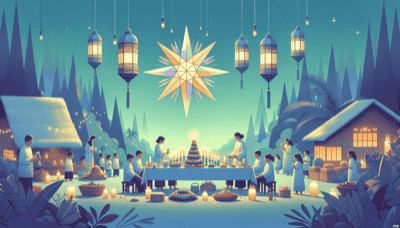We're here to help you keep count of the days to or since a date. Just click the button below and enter your chosen date to get started. Also choose the suggested days or search for a special day above #countingthedays

Christmas Day in the Philippines, celebrated on December 25th, is one of the most significant and cherished holidays in this predominantly Catholic country. Known for having one of the world's longest Christmas seasons, festivities start as early as September and continue until the Feast of the Epiphany in January.
The celebration of Christmas in the Philippines is heavily influenced by its colonial history, particularly the Spanish period that lasted for over 300 years. Many customs are derived from Spanish traditions, intertwined with indigenous practices and later American influences.
Simbang Gabi: A series of nine dawn masses leading up to Christmas Day, starting from December 16th. It's a deeply rooted tradition where Filipinos wake up before dawn to attend mass with the belief that if you complete all nine, a wish will be granted.
Noche Buena: The Christmas Eve feast after the midnight mass is an important family gathering with a spread that often includes lechon (roast pig), hamon (Christmas ham), queso de bola (edam cheese), fruit salad, and various rice cakes like bibingka and puto bumbong.
Parol: The Christmas lantern or 'parol' is an iconic symbol resembling the Star of Bethlehem. It's traditionally made out of bamboo and paper and now comes in various materials and sizes.
On Christmas Day itself, Filipinos typically:
Attend mass: Many attend church services on Christmas morning to celebrate Jesus Christ's birth.
Family gatherings: Families come together to share meals, exchange gifts (often through "Monito Monita," a local version of Secret Santa), and enjoy each other's company.
Children's caroling: Kids go door-to-door singing carols for small amounts of money or holiday treats.
Visit relatives: It's common to visit grandparents and other extended family members.
The spirit of "bayanihan," which means community cooperation, also shines during this season as people partake in local charity events or visit orphanages and hospitals to spread cheer among those less fortunate.